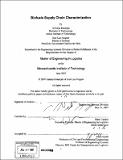Biofuels supply chain characterization
Author(s)
Banerjee, Anindya, M. Eng. Massachusetts Institute of Technology; Noguer, José Luis
DownloadFull printable version (19.01Mb)
Other Contributors
Massachusetts Institute of Technology. Engineering Systems Division.
Advisor
Chris Caplice.
Terms of use
Metadata
Show full item recordAbstract
Ethanol can be made from agricultural residues like wheat straw and from crops dedicated to energy use, like switchgrass. We study the logistics aspects of this transformation and determine the main characteristics of the supply chain making ethanol from cellulose. Important to the final acceptability of ethanol as a transportation fuel is both the economics as well as the environmental aspect of using ethanol. In this study we analyze the buildup of cost as biomass is transformed into fuel. We also look at all the steps involved and describe them from a supply chain perspective We have found that the main cost components in the cellulosic ethanol production are biomass production, harvesting and ethanol refining. We have also found that the main factor in reducing the overall production cost is the biomass to ethanol conversion factor. The development of new technologies to convert biomass into ethanol becomes a critical issue to achieve the cost targets imposed in order to make ethanol more competitive with other sources of energy such as fossil fuels. An increase in the current conversion factor of 42% could potentially yield to a decrease of nearly 15% in the: total production cost of cellulosic ethanol. (cont.) Other factors such as increasing the refining plant size and biomass yield can also help to reduce the production cost but we found its impact to be lower than that of the conversion factor. Finally, we also performed a strategic analysis of the entire supply chain to determine how is this industry likely to develop and who will have more bargaining power and therefore will realize most of the value and profits in the supply chain. Our analysis shows that in such a dynamic scenario as in the alternate energy industry, the best option is to build sustained advantage by strong alliances with different partners within the supply chain.
Description
Thesis (M. Eng. in Logistics)--Massachusetts Institute of Technology, Engineering Systems Division, 2007. Includes bibliographical references (leaves 84-89).
Date issued
2007Department
Massachusetts Institute of Technology. Engineering Systems DivisionPublisher
Massachusetts Institute of Technology
Keywords
Engineering Systems Division.